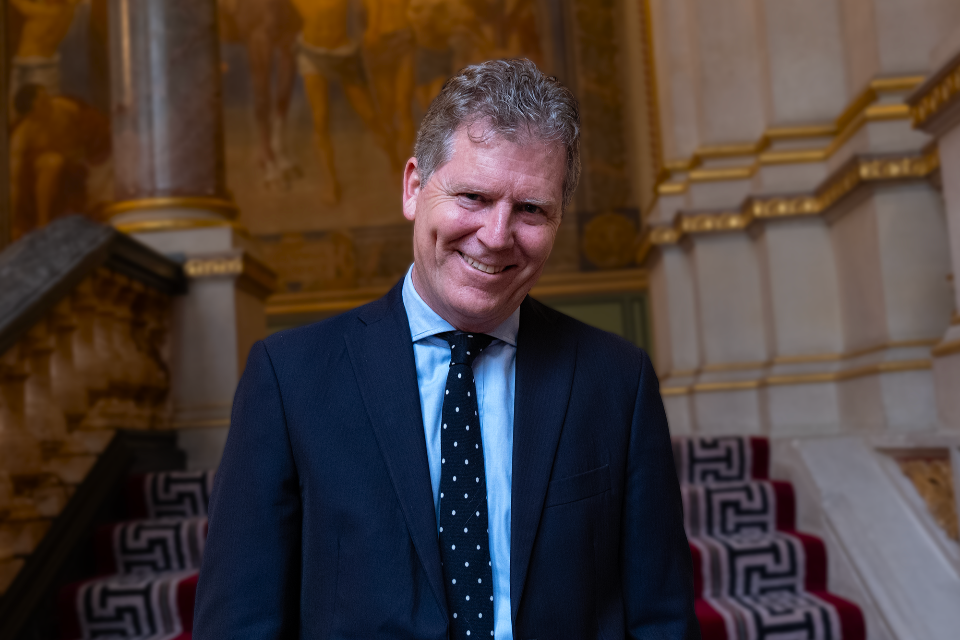
HexClad has taken the cookware world by storm, and Gordon Ramsay is a fan. Steve Dinneen has lunch with co-founder Danny Winer
Unless you’ve been on a social media blackout for the last five years, you’ve probably heard of HexClad, the maker of the world’s coolest pans. The company, which had revenues of almost $400m last year, is part owned by Gordon Ramsay and was included in Oprah Winfrey’s coveted list of her Favourite Things.
You can see why: in the hand HexClad pans feel expensive, which is just as well given the 12 inch version will set you back £135. The surface is textured with raised, stainless steel hexagons, with non-stick pooled in the recesses, allowing you to get a decent sear on, say, a steak, while minimising cleanup. Under the light the pans shimmer a faint midnight blue.
“Look, Gordon just messaged me,” says co-founder Danny Winer, brandishing his phone at me. “Sometimes I’m like ‘is this my life now?’” We’re sitting in a booth in Soho members’ club Quo Vadis, where 58-year-old Winer is eating a fillet of fish and diligently avoiding anything that looks like a carbohydrate: “I’ve probably gained eight pounds during the holiday, which Gordon is going to point out as soon as he sees me,” he sighs.
FROM ACTING TO SELLING
It wasn’t always this way. Winer’s route to kitchenware superstardom began with a career as a jobbing actor in his adopted hometown of LA. “I got some work, a few commercials, a couple of bit roles on a TV show. But there’s nothing creative about playing cop number three.”
Within a couple of years he was heading up the sales team for the cookware manufacturer. “I was pretty good at it. I could kind of do it in my sleep. And they were probably paying me too much, which is always both a nice thing and a bad thing.” This was some time around 2010, and Winer says he could already see the writing on the wall for the company.
“I realised the business model was not only antiquated, but it had a shelf life. And I could see it coming. I went to the owner with Facebook on my computer and said ‘This is where we need to be. We have to build a community and get in touch with our customers’. The guy said ‘Listen, kid, this Facebook thing is never gonna last’. That was the day I walked out.”
THE JUICEPRESSO YEARS
That was not, however, the day he started HexClad. He and his business partner Cole Mecray instead jumped on the juicing craze that was sweeping LA, bringing a product called the Juicepresso to market. “We underestimated the laziness of the American people,” he says. “That regardless of whether they could afford it or not, they were going to buy their juice premade.” But Juicepresso established a business model that worked: Winer would spend his days flying from LA to vast trade shows in China and Germany, scouting for innovative products he could launch in the US.
“When I got to the door of the convention hall there were all these Chinese soldiers guarding the door. Xi Jinping was there, cutting a ribbon or something. I was like ‘God damn Xi Jinping, making me late!’ So I had to go down into the basement, and that’s where I saw a guy selling this Korean barbecue plate covered in hexagons…”
MAXED OUT CREDIT CARDS
The rest is a classic tale of maxed out credit cards and garages full of stock as Winer and Mecray invested every cent in bringing their first pan to market. It was a hit: in 2017 they made around $550,000 in sales. A year later they hit $10m. One of those sales was to a chef called Gordon Ramsay, who followed the company on Instagram. Winer reached out to solicit an endorsement only to be told “Gordon doesn’t do endorsements. If you want him to do a commercial, that’ll be a million pounds. But he’s open to something more ‘robust…’”
The details of their agreement is subject to an NDA but Winer says “Gordon is an equity holder. We came out with a very fair contribution in terms of both time and money that gives him a fairly decent size [stake in the company]”. Ramsay helped take HexClad to the next level, with the company growing exponentially over lockdown, when home cooking was an enforced reality; Winer says the business is also “highly profitable”.
SELLING OUT
So he must be rubbing his hands together in anticipation of cashing out, right? “No, not necessarily, actually. Maybe I’m a dummy but I didn’t start the company to sell it. So many people do but I think that’s why we’re successful. To get me to sell would have to be such an offer that… I don’t even know.” Everybody has a price, of course, and he admits companies have been sniffing around.
“I’d be open to a minority deal,” he says. “The right, one, you know, where we got to keep the direction of the company. But the idea of exiting completely? I don’t really see that.” He washes down the last of his meal with a glass of white wine. Next stop: Florence, where he says he owns “a little apartment that I’ve never actually slept in”.
He may not have made it in Hollywood but Winer is enjoying the A-lister lifestyle now.
Read more: Cooking up a storm: Recipe biz Mob will be ‘smart about revenue’ amid recessionary hit on digital ads
Read more: How to cook linguine alla vongole e bottarga, by Giulio Rossi










